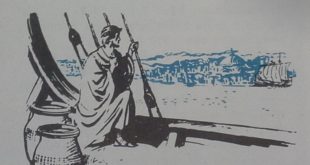The civilizations of India, China and the Moslem world progressed to about the year 1500 A.D., but what had been happening in western Europe in the centuries after Roman power began to decline and barbarian tribesmen had overrun the lands once part of the proud Roman Empire? What had taken the place of Roman might, government and law in western Europe? As Rome’s rule faded away, western Europe entered a period known as the Middle Ages or the medieval period. For a long time there was neither a single empire nor nations as we know them to day. Central governments, …
Read More »Tag Archives: St. Benedict
Christianity Spread in a Divided Empire
Christianity was the movement that spread Across the Roman Empire Pointing the way for the rest of the ancient world toward belief in a single God. The year is 400 A.D. Andropolos paces impatiently up and down the deck of the merchant ship. He is eager to get back home; and to Andropolos, home is the city of Constantinople, a new capital of the Roman Empire. He can already see the walls and buildings of the great city shimmering in the distance. Now the ship is nearing the narrow Bosporus, the waterway where Europe and Asia are hardly a mile …
Read More »The Power of the Church 529 – 1409
IN THE YEAR 1134, in the town of Chartres in France, the church burned down. The church was a cathedral — that is, it was the church of a bishop. The bishop at that time was Theodoric and he immediately began the construction of another cathedral. He knew that the task would not be an easy one; it meant raising large sums of money and finding many workmen and the actual work of building would take years. Bishop Theodoric allowed nothing to stop him, he won the support of the people, of commoners and nobles alike. An eye-witness, who visited …
Read More »

